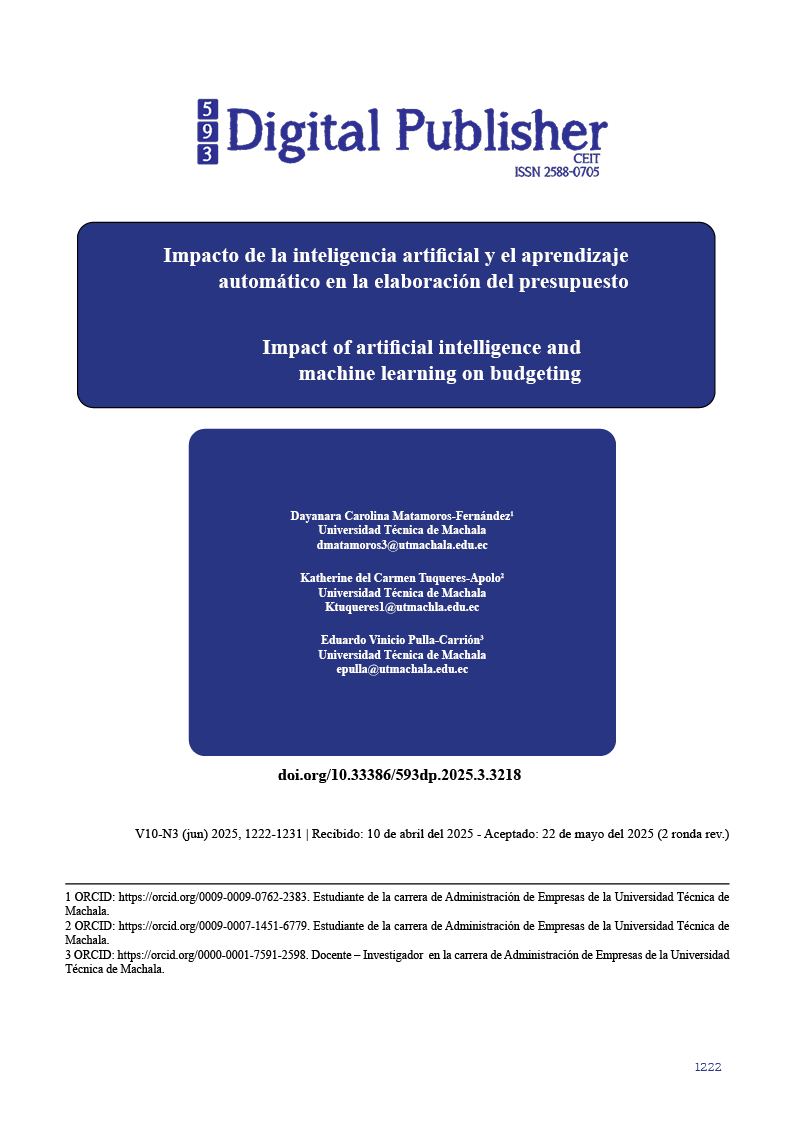Impact of artificial intelligence and machine learning on budgeting
Main Article Content
Abstract
This study examines in depth the impact of Artificial Intelligence (AI) on budgeting in companies and across various production sectors in the city of Machala, Ecuador. The research shows that the adoption of these technologies has led to notable advances in operational efficiency, accurate financial estimates, and a significant reduction in the time spent on monotonous tasks. This study aims to analyze the impact of AI on corporate budgeting processes, identifying the key benefits and main challenges associated with its implementation in different production sectors in the city of Machala, Ecuador. A mixed methodological approach was used, combining quantitative and qualitative analysis. Fifty structured surveys were conducted among executives and financial officers of companies belonging to different production sectors. The data obtained were processed and statistically analyzed using SPSS software, complemented by in-depth interviews to delve deeper into qualitative aspects. It was found that most companies use AI-based technologies in their budgeting processes, achieving significant improvements in operational efficiency and financial accuracy, as well as a substantial reduction in the time spent on repetitive tasks. The research concludes that the strategic implementation of AI has a considerable positive impact on corporate budgeting processes, despite the inherent challenges, and promotes fostering an organizational culture oriented toward technological innovation, ongoing training, and constant ethical monitoring to maximize benefits and mitigate associated risks.
Downloads
Article Details

This work is licensed under a Creative Commons Attribution-NonCommercial-ShareAlike 4.0 International License.
1. Derechos de autor
Las obras que se publican en 593 Digital Publisher CEIT están sujetas a los siguientes términos:
1.1. 593 Digital Publisher CEIT, conserva los derechos patrimoniales (copyright) de las obras publicadas, favorece y permite la reutilización de las mismas bajo la licencia Licencia Creative Commons 4.0 de Reconocimiento-NoComercial-CompartirIgual 4.0, por lo cual se pueden copiar, usar, difundir, transmitir y exponer públicamente, siempre que:
1.1.a. Se cite la autoría y fuente original de su publicación (revista, editorial, URL).
1.1.b. No se usen para fines comerciales u onerosos.
1.1.c. Se mencione la existencia y especificaciones de esta licencia de uso.
References
Contreras Contreras, F., & Olaya Guerrero, J. C. (2024). Beneficios de la implementación de la inteligencia artificial en la administración de empresas: una revisión sistemática. Impulso, Revista De Administración, 4(8), 213-228. doi:http://doi.org/10.59659/impulso.v.4i8.58
Alcivar Chiluiza, D. J., Guerra Herrera , A. D., & Vera Vera, J. R. (2025). La inteligencia artificial en la gestión hotelera del destino Manta: Adopción y tendencias futuras. Revista Amazónica de Ciencias Económicas, 4(1), 1- 11. doi:https://doi.org/10.51252/race.v4i1.803
Arguello, S., Castillo, B., & Zonin, S. (2025). El Ethos digital en la Regulación Ética de la Inteligencia Artificial en la Gestión Pública. Recihys, 1(3), 1-8. doi:https://doi.org/10.24133/recihys.v3.i1.4090
Contreras, F., & Olaya, J. (2024). Beneficios de la implementación de la inteligencia artificial en la administración de empresas: una revisión sistemática. Impulso, 4(8), 213-228. doi:https://doi.org/10.59659/impulso.v.4i8.58
Cruz, D., Fernández, V., & Ramón, G. (2022). Del presupuesto electrónico al presupuesto inteligente: Explorando el potencial de la inteligencia artificial en la toma de decisiones gubernamentales para la asignación de recursos. Government Information Quarterly, 39(2), 101644. doi:https://doi.org/10.1016/j.giq.2021.101644
Fontenla, O., & Calvo, J. L. (2018). Inteligencia artificial en la ingeniería: pasado, presente y futuro. Perspectiva, 3, 350-352. doi:https://doi.org/10.6036/8639
Galiana, I., Gudino, C., & Miramontes, P. (2024). Ética e inteligencia artificial. Revista Clínica Española, 224(3), 178-186. doi:https://doi.org/10.1016/j.rce.2024.01.007
Guerrero, W., & Camacho, S. (2024). Impacto de la inteligencia artificial en la toma de decisiones financieras: oportunidades y desafíos para los líderes empresariales. DYNA, 91(233), 168-177,. doi: https://doi.org/10.15446/dyna.v91n233.114660
Incio Flores, F. A., Capuñay Sanche, D. L., Estela Urbina, R. O., Valles Coral, M. Á., Vergara Medrano, S. E., & Elera Gonzales, D. G. (2022). Inteligencia artificial en educación: una revisión de la literatura enrevistas científicas internacionales. Apuntes Universitarios, 12(1), 353-372. doi:https://doi.org/10.17162/au.v12i1.974
Juca Maldonado, F., Carchi Arias , K. L., & Rosales Muñoz , C. (2024). Transformación Contable: El impacto de la inteligencia artificial en la eficiencia de los procesos de análisis de costos. Sapientia Technological, 50–60. doi:https://doi.org/10.58515/edesp1spt05
Martínez Aguirre, S., & Sanz Valero, J. (2024). La inteligencia artificial y la salud laboral. Medicina y Seguridad del Trabajo, 70(274), 1-9. doi:https://doi.org/10.4321/s0465-546x2024000100001
Parra, J., & La Madriz, J. (2017). Presupuesto como instrumento de control financiero en pequeñas empresas de estructura familiar. Revista Científica Electrónica de Ciencias Gerenciales(38), 33-48. doi:http://doi.org/10.5281/zenodo.5152387
Quispe , R., Rios, F., Quispe, F., Tafur, D., Vidal, R., & Mirko, M. (2024). Impacto de la Inteligencia Artificial (IA) en la gestión financiera empresarial. SCIÉNDO, 27(2), 303-313. doi:https://doi.org/10.17268/sciendo.2024.044
Sánchez Caguana, D. F., Philco Reinozo, M. A., Salinas Arroba, J. M., & Pico Lescano, J. C. (2024). Impacto de la Inteligencia Artificial en la Precisión y Eficiencia de los Sistemas Contables Modernos. Journal of Economic and Social Science Researc, 4(3), 1–12. doi:https://doi.org/10.55813/gaea/jessr/v4/n3/117
Sanz, J., & Martinez, S. (2024). La inteligencia artificial y la salud laboral. Medicina y Seguridad del Trabajo , 70(274), 1-9. doi:https://doi.org/10.4321/s0465-546x2024000100001
Sosa Sierra, M. D. (2007). Inteligencia artificial en a gestión financiera empresarial. Pensamiento y Gestión, 23(2), 153-186. Obtenido de https://rcientificas.uninorte.edu.co/index.php/pensamiento/article/view/3518
Valle, D., Fernández, V., & Gil-Garcia, R. (2023). Inteligencia artificial y planeación presupuestaria en México: promesas y retos en América Latina para la asignación del gasto público. Revista del CLAD Reforma y Democracia, 85(2), 5-52. doi:https://doi.org/10.69733/clad.ryd.n90.a418




